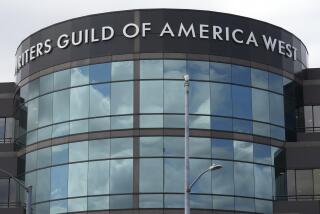Industry Targets File Swappers’ Employers
- Share via
In their latest bid to crack down on Internet music piracy, major record labels have targeted about 300 companies whose computers were used by employees to feed file-swapping networks.
The Recording Industry Assn. of America sent letters to the companies in the last week, informing them of the alleged piracy and warning of “significant legal damages” for employees and employers alike -- though the letters make no explicit threat to sue.
In one letter, RIAA President Cary H. Sherman says only that the consequences for not acting “can be quite serious.”
The campaign is the RIAA’s first systematic effort to ferret out pirates on corporate computer networks. In October and February, the group sent warnings about the consequences of piracy to Fortune 1,000 companies. The RIAA declined to name the companies that received the latest letter, saying only that some were on both lists.
The record labels have made a similar effort to enlist universities in the fight against file-sharing piracy, which thrives on the kind of high-speed Internet connections prevalent in schools and workplaces.
Copyright law experts said companies might be liable for piracy on their networks if they know about it but don’t intervene, or if they stand to gain financially from it. What’s not clear is whether companies have a duty to police their networks and remove unauthorized copies of songs before they’re asked to do so, said Mark Radcliffe, a lawyer in Palo Alto who specializes in intellectual property.
“I think what they’re trying to do is get people thinking ‘Gee, I’m in this gray area, and I don’t want to be the guy who gets fingered for the test case,’ ” Radcliffe said. “As a corporation, do you really want to be in the news defending the right of your employees to have pirated music on your network?”
The RIAA’s action drew a rebuke from the Information Technology Assn. of America, a trade group representing Microsoft Corp., IBM Corp., Hewlett-Packard Co. and more than 400 other software and service companies.
“When corporations are trying to protect themselves from major hackers and terrorists ... trying to do serious damage to their networks, I don’t know that they want to spend their time chasing down a half-dozen employees who like to trade old Rolling Stones songs,” said the group’s president, Harris Miller. “It’s a matter of prioritization.”
Miller said his group opposes piracy, given tech companies’ own problems with software theft. But the labels erred in not coming up with a new business model for the Internet age, he said, and now “they’re looking for every way they can find to get somebody else to fix their mistake.”
An RIAA spokesman responded, “It’s curious that Mr. Miller apparently overlooked one of the greatest threats to network security, and that is the unauthorized file-sharing networks. The letter clearly points out the benefits to companies in addressing this problem.”
In one letter, Sherman says RIAA investigators traced a user of the Kazaa, Grokster or iMesh file-sharing systems to a specific Internet address, then traced the address to a company’s computer network. Noting that the user was offering copyrighted songs for others to download for free, the letter states that “your computer network and resources are being used to illegally distribute copyrighted music on the Internet.”
It adds that the search was limited and “could well indicate that this activity is widespread on your network.”
And it points out that copyright owners can collect up to $150,000 per song copied without permission, plus legal fees and profits earned by the infringer, and that the equipment used to make illegal copies can be confiscated. In one case, the RIAA found 20,000 songs being offered by 70 employees.
The letter warns that giving employees access to file-sharing networks involves other risks, including the chance that workers inadvertently will import computer viruses, clog Internet connections and allow competitors to copy corporate information.
About 35% of the letters went to technology companies, 20% to health-care firms, 20% to manufacturers and the rest to miscellaneous industries, the RIAA said.
The letters don’t ask for the companies to identify the infringers. That’s a battle the RIAA is fighting in court with Verizon Communications Inc., which is appealing a federal judge’s order to identify a Kazaa user sought by the record firms.







